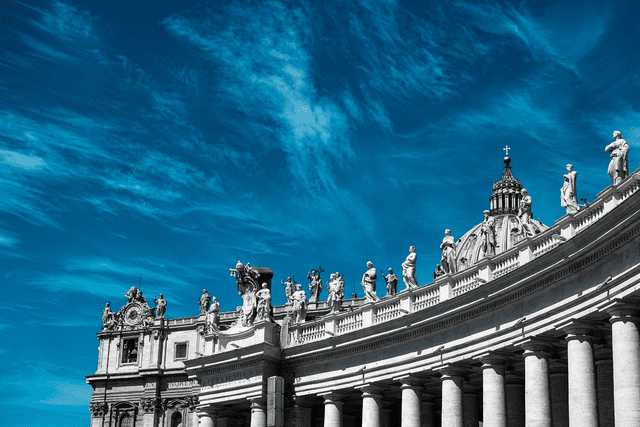“[T]he Earth must be worked and nursed, cultivated and protected. We cannot continue to squeeze it like an orange. And we can say that this – taking care of the Earth – is a human right.” Pope Francis broadcast these urgent words from his private study on the first floor of Domus Sanctae Marthae — the pope’s residence — while seated in front of an impressive bookcase, decked in his elegant white cassock, with the instantly recognizable pectoral cross suspended from his neck. This location by the pope was intentional, and has far more meaning attached to it than is recognizable at first glance. As TED’s Global Curator Bruno Giussani told TEDBlog, choosing to live in this relatively modest complex instead of the traditional, grand Apostolic Palace, the pope conveys that “just because things have been done a certain way in the past doesn’t necessarily mean they can’t be changed.”
“Our Moral Imperative”
The pope’s second TED Talk also contained a similar message about altering previous customs for the betterment of the environment too. The October 10th speech came as part of the virtual launch of TED’s Countdown, “a global initiative to champion and accelerate solutions to the climate crisis, turning ideas into action.” No stranger to advocating for climate care, Pope Francis’s 2015 encyclical, Laudato si’ (Praise be to You), built on an extensive history of teachings about creation, emphasizing the need to safeguard nature more than ever before. In it, he called for “the whole human family” to “cooperate as instruments of God for the care of creation, each according to his or her own culture, experience, involvements and talents.” Now, in the face of raging wildfires, torrential storms, and the merciless COVID-19 pandemic, that message is even more pertinent. The pope accordingly presented an updated call to action at the TED conference: “I would like to invite all people of faith, Christian or not, and all people of good will, to embark on this journey, starting from your own faith, or if you do not have a faith, from your own intention, from your own goodwill.”
In this most recent TED Talk, Pope Francis laid out a very detailed, three-pronged approach to preserve our common home, beginning with education — we must use both science and ethics to teach people about conservation methods, emphasizing the connection between the environment and human beings. Next, prioritization — we need to focus on access to clean water and sufficient nutrition, which are essential for our lives and everything we do in them. Thirdly, the shift to clean energy — we should transition from fossil fuels to clean energy, and follow the lead of the many religious organizations that have chosen to invest solely in companies that emphasize “sustainability, social justice and the promotion of the common good.” By pursuing these avenues of action, we can act as responsible stewards of the land over which God gave us dominion and create a positive and permanent impact.
Zero Carbon Emissions by 2050 for Vatican City
It seems the pope is already doing his part to make this vision a reality. On December 12, roughly two months after his TED Talk and on the fifth anniversary of the adoption of The Paris Agreement, Pope Francis announced to a Climate Ambition Summit co-hosted by the United Nations that Vatican City is dedicated to reaching net zero carbon emissions by 2050. The Holy See has also created plans to intensify “efforts at environmental management that have already been in process for some years, and which make possible the rational use of natural resources such as water and energy, energy efficiency, sustainable mobility, reforestation, and the circular economy also in waste management.” Impressively, the Vatican has already achieved some of its prior goals — it has banned single-use plastics and currently recycles 65% of its waste, with a goal to recycle an additional 10% by 2023. In the coming years, expect to see the world’s smallest state – 108 acres housed within Rome – using water more responsibly, planting groves of trees, and turning to electric or hybrid car models, among other vital initiatives. Despite all this environmental emphasis, however, the pope does not view the path forward solely through an environmental lens.
Connected in Integral Ecology
In both of his TED Talk appearances, Pope Francis highlighted his endorsement of educational initiatives in sustainability and “integral ecology,” a term which refers to all things being closely interrelated. Through this concept, he emphasizes the social implications of good climate care — we are dependent on one another just as we are dependent on Earth itself. So, the pope proclaimed, we must, “respond together to the cry of the Earth, as well as to the cry of the poor.” Pope Francis therefore urges us to look after our fellow humans and work toward social equity in what he described to the United Nations as a “culture of care.”
In the shift to a cleaner environment, for example, we should stay vigilant about the negative effects on low-income communities and workers in the energy industry as they are most likely to be impacted by the transition, and look out for the poor who are most vulnerable to climate events and to COVID-19. At the same time, it is vital that we make advancements in our dedication to climate care because it will benefit generations beyond our own. We can start to build a better future for our children’s children, today.
The pope invites us on a journey “of transformation and of action,” challenging us to assume environmental and social responsibility. If we heed his call, we can transform our relationship with the world around us into one of consistent care while glorifying God through his creation. After all, “The earth is the Lord’s, and all its fullness, The world and those who dwell therein.”




 Copyright
2025
Root and Vine
Copyright
2025
Root and Vine